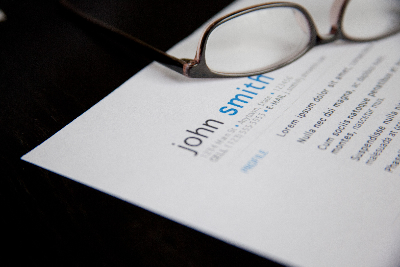- Resume Writing Tips
 Your resume is simply a word picture of the unique skills and qualities that you can offer an employer. How your resume looks can make the difference in whether you are chosen for an interview or not. There are steps in creating a highly effective and visually pleasing resume. The following are a few tips in resume writing.
Your resume is simply a word picture of the unique skills and qualities that you can offer an employer. How your resume looks can make the difference in whether you are chosen for an interview or not. There are steps in creating a highly effective and visually pleasing resume. The following are a few tips in resume writing.- Include all of your contact information on the top of the resume. This includes name, telephone numbers, physical address and email address.
- Write an objective that is precise and to the point. Taylor it to the company and position you are applying for. Use action words and make it as short and powerful as possible.
- Keep the length of your resume to 1 or 2 pages. Use an easy to read font like Times New Roman. Use a font size no smaller than 8 and no larger than 14.
- Document your experience by using numbers. For example, “ Increased membership by 25% in 6 months” or “Supervised 20 employees in a fast paced foodservice environment”.
- Use key words to highlight your skill set. Especially if you are applying for a technical position. Use words that are commonly used in that particular industry. Employers are using the internet to search for employees more and more these days and use keywords.
- Sell yourself. Write about your responsibilities and accomplishments. Try to include everything relevant and be specific. Do not exaggerate. If you have gaps in your employment history be ready to explain. But don’t go into specifics on the resume.
- Do not include a photo. Use white or off white 8 ½ x 11 paper.
- Proofread! And proofread again. You will not impress your potential employer with misspelled words and typing errors.
- Make sure you follow directions how to deliver your resume. It could be by mail, fax, e-mail or electronically in some other way. The employer will specify.
By using these resume writing tips, you will be well on your way to finding the right job for you.
- Preparing For an Interview
 PHR Staffing Solutions specializes in placing professionals in a variety of interesting jobs like light industrial, office support, accounting, information technology and management. No matter what type of job you are seeking, it is important to prepare for the interview. It is your job to convince a recruiter that you have the skills, knowledge and experience for the job. The more prepared you are, the better your chance of being offered the position.
PHR Staffing Solutions specializes in placing professionals in a variety of interesting jobs like light industrial, office support, accounting, information technology and management. No matter what type of job you are seeking, it is important to prepare for the interview. It is your job to convince a recruiter that you have the skills, knowledge and experience for the job. The more prepared you are, the better your chance of being offered the position.- Research the company you are interviewing with. It will show you are interested.
- Prepare your responses to the most common interview questions.
- Bring extra copies of your resume, a note pad and pen and a list of references.
- Make sure you have precise directions to the interview location. Ask who you will be interviewing with and confirm the time. Arrive a few minutes early.
- Dress for success. Wear conservative business attire. Be sure that your clothes are neat and wrinkle-free. Your overall appearance should be neat and clean. It is important to make a great first impression.
- Turn your cell phone off. You should never answer a call during an interview.
- Pay attention to non-verbal communication. Be confident, sit up straight and be attentive.
- Write down some questions to ask. Ask the interviewer what it is like to work for the company and about the position you are interviewing for. Ask them why they like the company.
- Always follow up after the interview with a thank you note or phone call.
- Conduct During the Interview
 PHR Staffing Solutions works with a vast array of employers and the many different jobs that they offer. They way you conduct yourself during an interview can determine whether you are the right candidate for the position. Here are some general guidelines to follow during an interview.
PHR Staffing Solutions works with a vast array of employers and the many different jobs that they offer. They way you conduct yourself during an interview can determine whether you are the right candidate for the position. Here are some general guidelines to follow during an interview.During the interview:
- Be 10-15 minutes early to the interview.
- Bring a copy of your resume.
- Listen closely to the interviewer. Do not interrupt. Answer questions as positively and precise as possible.
- Watch your posture. Sit up straight and pay attention. Body language sometimes conveys more than the spoken language.
- Be positive about your strengths and honest about your weaknesses. Show a sincere attitude in wanting to improve. Be excited about possible training in a new position.
- Try to be enthusiastic about past and potential job duties. Explain how your skills and experience qualify you for the job.
- Do not wear overpowering cologne. Avoid excessive jewelry and bright colors.
- Do not smoke, chew gum or eat during an interview.
- Don’t divulge personal information, such as, family issues, child care issues, or negative comments about a former employer.
- Have a summary of your education, job history and previous job titles. Include examples of how you improved productivity in your work environment. Include certificates, letters and articles that highlight your achievements. Have them neatly displayed so that the employer will see that you prepared it specifically for the interview.
- At the end of the interview, thank the interviewer and ask when they expect to make a decision. Say you are looking forward to their call. Send a thank you email or card after you leave.

